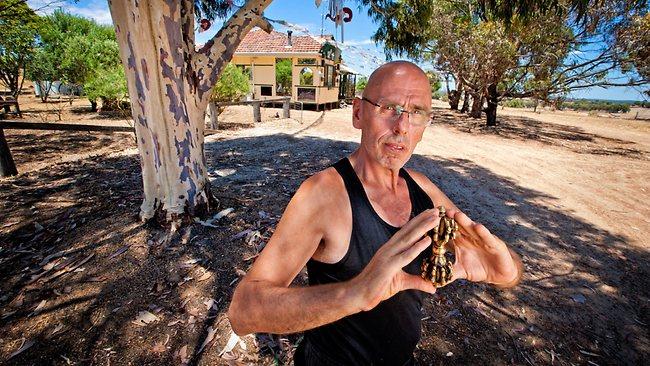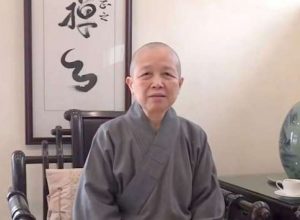
The end of 2012 marked an important milestone in academic Buddhism. During the PNC conference held at Berkeley University on 7-9 December Venerable Vello Vaartnou, a Buddhist monk from Australia, launched his ambitious new project, an online Chinese Buddhist Encyclopedia. This is a monumental and daunting task expected to continue long after most of our lifetimes.
Ven. Vaartnou has been a dedicated Buddhist for over 40 years and has taught Buddhism in many countries. He has been a pioneer in Estonian Buddhism by establishing the first nyingma movement and the Estonian Buddhist Brotherhood in 1980. He has translated books and texts, built seven stupas (including the first stupas in Northern Europe), and temples.
Ven. Vaartnou has been instrumental in making Buddhist teachings more available by using the latest technological developments. He is the first person to use computers to paint thangkas and design temples with 3-D software and is today the author of two online Buddhist Encyclopedias (History of Buddhist Australia and the Chinese Buddhist Encyclopedia) and founder of two annual international Buddhist conferences in Europe and Australia.
Rationale for a Chinese Buddhist Encyclopedia
Chinese Buddhism has a very rich and colorful history and presence. China currently has a vast amount of different Buddhist materials, including texts, chronicles, commentaries from practitioners, sutras, tantras, paintings, sculptures, temples, shrines, monasteries, etc. In modern China, numerous Buddhist traditions are practiced.
China has one of the biggest Buddhist populations in the world. Along with its significant and increasing global influence, it has great potential to preserve and develop the Buddhist tradition.
To maximize the impact on more Buddhist readers around the globe, the on-Line Buddhist Encyclopedia of China is in both Chinese and English. The first entries for the Chinese Buddhist Encyclopedia were posted in December 2012 and have since grown to 20,000 articles in English and 4,000 in Chinese.
The CBE sets into logical and chronological order Buddhist materials and information, which have accumulated over thousands of years, adding new cultural perspectives. The online Encyclopedia provides an opportunity for people to deepen their knowledge of Buddhism in Chinese and English. It is hoped that other languages will gradually be added.
The First Year
The Encyclopedia (www.chinabuddhismencyclopedia.com) has collected and posted all existing digitized materials; digitizing additional historical texts, documents and materials and creating and promoting new forms of Buddhist education (3D, Buddhist films, etc.) During the first year we have gathered, inserted, illustrated and provided links to more than 20,000 articles in English and 4,000 in Chinese.
The encyclopedia currently has 36 categories with over 1,400 sub-categories: Buddhism and Science, Buddhism Related Articles, Architecture, Art and Culture, Cosmology, Festivals, Geography, Organizations, Philosophy, Practices, Buddhist Studies, Symbols, Teachers, Buddhist Views, Chinese Buddhism, Death & Rebirth, Deities, Famous Buddhists, History of Buddhism, Japanese Buddhism, Mahayana, Meditation, Monasteries, Rituals, Scholars in Buddhist studies, Theravada Buddhism, Tibetan Buddhism, Translators, Vajrayana, Zen etc.
The encyclopedia already contains Sanskrit, Pali, Tibetan, Japanese, Chinese and Zen dictionaries and is unique with its internal textual and abundant materials.
Uniqueness of CBE
*CBE collects existing digitized materials on Buddhism and presents an academic approach to different aspects of Buddhism made accessible to people today.
*CBE contains links in every article, enabling readers to find further explanations to deepen their knowledge of the topic.
*CBE has a large number of illustrations that explain texts.
*No other Encyclopedia has such links and illustrations.
*The Encyclopedia offers free access to anyone, anywhere, anytime.
Managing the CBE project
To date, the success of the project depends on the dedication of Ven. Vaartnou and one volunteer who have spent countless hours putting the CBE online without official funding. For example Lotterywest, run by State Government of Western Australia, wrote:
“We do not have any interest in projects which are for the benefit of the international academic community or for the benefit of the international Buddhist community. “
This is unfortunate and shortsighted if one considers the size of the Buddhist community worldwide, academic studies devoted to Buddhism and the fact that Buddhism is one of the fastest growing religions in Australia.
The emphasis of CBE aim is preservation. This is vital in these rapidly changing times to gather all available materials, translate and digitize them. The influence of internet has been dramatic over the past 20 years but as we know, these changing times also provide new opportunities. The Chinese Buddhist Encyclopedia is just one example of how these changes can be skillfully used to the advantage of Buddhism.
The Future
The Encyclopedia is a vast project that will take decades to reach its final potential and will utlilise the latest developments in computer technology and the internet to achieve this potential.
There are thousands of people all over the world who read the encyclopedia looking for information about Buddhism. The project has received many support letters from scientists, monastics and laypeople. Dr. Bolsokhoeva, a Tibetologist and specialist in Tibetan medicine: Vello Vaartnou is the only person with the understanding of the material and the drive to carry out such a significant project. Professor Lionel Obadia from L’université Lumière Lyon 2, wrote “ This is an impressive work and very useful tool – well done !”
We could say that the first year of the Chinese Buddhist Encyclopedia has been extremely successful. The Encyclopedia is used by universities, schools, monasteries and other institutions as a valuable online resource on Buddhism. The users of the CBE can be found worldwide and continues to grow.
After the 3rd international conference Buddhism & Australia in February 2014 in Perth, of which Vaartnou is the organiser, he will leave Western Australia to visit Taiwan , Mongolia and Bhutan to discuss the further development of the encyclopedia project.
Related Links:











